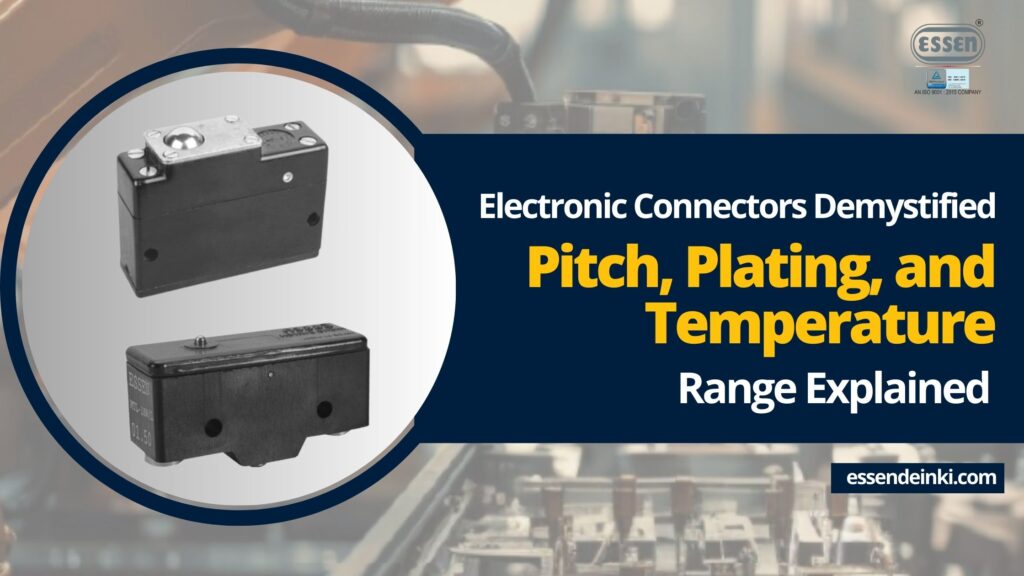In the intricate world of electronics, the reliability and performance of your devices hinge significantly on the quality of Electronic Connectors. These components, though often overlooked, are pivotal in ensuring seamless signal transmission and power distribution. At Essen Deinki, we understand the critical role connectors play in modern applications. This comprehensive guide delves into three fundamental aspects of Electronic Connectors: pitch, plating, and temperature range, providing clarity to help you make informed decisions for your projects.
Understanding Electronic Connectors
Electronic Connectors are devices that facilitate the joining of electrical circuits, allowing current or signals to flow between components. They come in various forms, each designed to meet specific requirements in terms of size, durability, and functionality. Essen Deinki offers a diverse range of connectors, including the P-Series, PBL Profile Series, and 854/855 Series, each tailored to cater to different industrial and commercial needs.
Pitch: The Foundation of Connector Compatibility
What is Pitch?
Pitch refers to the center-to-center distance between adjacent pins or contacts in a connector. This measurement is crucial as it determines the connector’s compatibility with printed circuit boards (PCBs) and other components. A mismatch in pitch can lead to improper mating, signal interference, or even physical damage to the connector or PCB.
Standard Pitch Sizes
Essen Deinki’s connectors typically adhere to standard pitch sizes, ensuring broad compatibility:
- 54 mm (0.1 inch): Common in the P-Series and 854/855 Series, this pitch size is widely used in various applications due to its balance between density and ease of handling.
Selecting the appropriate pitch size is essential for ensuring reliable connections and maintaining the integrity of your designs.
Plating: Enhancing Durability and Conductivity
The Role of Plating
Plating in connectors serves multiple purposes:
- Corrosion Resistance: Protects the connector from environmental factors that could lead to degradation.
- Improved Conductivity: Enhances the flow of electrical signals by reducing resistance.
- Wear Resistance: Extends the lifespan of the connector by minimizing wear and tear during mating cycles.
Common Plating Options
Essen Deinki provides various plating options to suit different application needs:
- Gold Plating: Offers excellent conductivity and corrosion resistance. Available in selective gold plating (only on the mating area) or full gold plating.
- Tin Plating: Provides a cost-effective solution with adequate conductivity and corrosion resistance.
- Nickel Plating: Often used as an underlayer to enhance the adhesion of other plating materials.
Choosing the right plating depends on factors like environmental conditions, required lifespan, and budget considerations.
Temperature Range: Ensuring Reliability Across Conditions
Importance of Temperature Range
The operating temperature range of a connector indicates the spectrum of temperatures within which the connector can function reliably. Exposure to temperatures beyond this range can lead to:
- Material Degradation: Insulating materials may soften or become brittle.
- Contact Failure: Solder joints and contacts may degrade, leading to intermittent or complete loss of connectivity.
- Mechanical Stress: Expansion and contraction of materials can cause physical damage.
Temperature Ratings in Essen Deinki Connectors
Essen Deinki’s connectors are designed to withstand a wide range of temperatures:
- P-Series and PBL Profile Series: These connectors are rated for temperatures from -55°C to +125°C, making them suitable for industrial and automotive applications where exposure to extreme temperatures is common.
- 854/855 Series: Also rated for -55°C to +125°C, these connectors are ideal for applications requiring high-density connections and durability.
Selecting a connector with an appropriate temperature rating ensures reliable performance in your specific application environment.
Choosing the Right Connector for Your Application
When selecting an electrical connector, consider the following factors:
- Application Requirements: Determine the specific needs of your project, including space constraints, environmental conditions, and electrical requirements.
- Connector Specifications: Match the connector’s pitch, plating, and temperature rating with your application’s needs.
- Quality and Reliability: Opt for connectors from reputable manufacturers like Essen Deinki, known for their commitment to quality and performance.
- Compliance Standards: Ensure the connector meets relevant industry standards and certifications.
By carefully evaluating these factors, you can select a connector that ensures the reliability and longevity of your electronic systems.
Conclusion
Electronic Connectors are integral to the performance and reliability of electronic systems. Understanding the significance of pitch, plating, and temperature range is essential in selecting the right connector for your application. Essen Deinki’s range of connectors, including the P-Series, PBL Profile Series, and 854/855 Series, offers solutions tailored to meet diverse industrial and commercial needs. By considering these key aspects, you can make informed decisions that enhance the efficiency and durability of your electronic designs.
For more information on Essen Deinki’s range of Electronic Connectors and to find the perfect solution for your needs, visit Essen Deinki Electronic Connectors Suppliers Page.


